On This Date In History, July 3rd
July 3rd, 1863, marked the third and final day of the Battle of Gettysburg. Considered by many to be the turning point of the war, the battle itself and the war, was still undecided. The reason this battle was taking place so deep into Union territory, which was different considering most of the battles to this point had taken place in states like Virginia and Tennessee, was because Confederate General Robert E. Lee wished to give war torn Virginia a reprieve. He also had hoped to reach deep enough into the North, Harrisburg or even Philadelphia, with the purpose of hurting northern morale, which would then force the Union to accept an armistice.
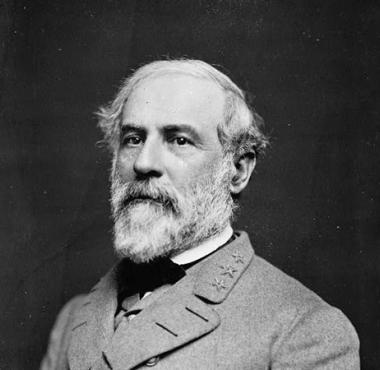
On July 1st, the first day of the battle, though both armies weren’t at full strength the Confederates had the numerical advantage. The purpose of the Union Army was to delay the Confederates until the rest of the Union Army could arrive. The Union Army had taken up a position on the ridges Northwest of Gettysburg, it is here where the Confederates first engaged with the Union. Though the Union had the high ground, by midday, the Confederates had forced a Union retreat to Cemetery Hill, which was south of Gettysburg. There are arguments over why the Union retreat took place, but its ultimately of little importance, as Cemetery Hill was the highest point in Gettysburg, and it provided a major strategic advantage for the Union. Though Confederates won the first day of battle, with both Armies almost at full strength by the end of the day, the battlefield was still up for grabs.
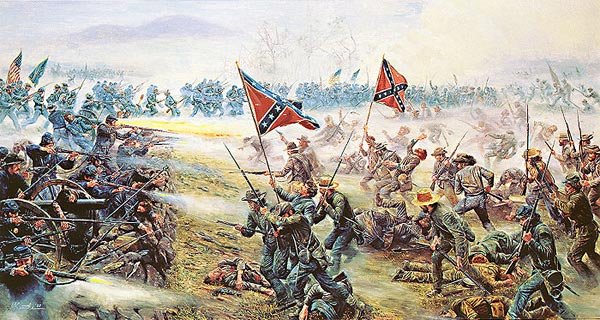
An artists renditions of one of Lee's many failed charges.
On July 2nd, the second day of battle, though reinforcements for both sides still trickled in, both armies were practically at full strength. General Lee’s goal was to attack the Union forces in and around Cemetery Hill, push them from that position, and destroy the Union army. However, the Union Army had a solidified position on Cemetery Hill, and their forces were in the shape of a fish hook. This defensive position allowed the Union Army to be more consolidated, which allowed them to provide more concentrated fire on the more spread out charging Confederate Forces. Over the course of the day, the Confederates charged the entrenched Union Army multiple times in hopes of dislodging them, all the assaults failed. By the end of the day, the Confederate Army had gained no ground. Though the second day of battle was technically a stalemate, due to the lack of Confederate success on day two compared to day one, and the amount of casualties the Confederates took, men on both sides considered day two to be a victory for the Union.
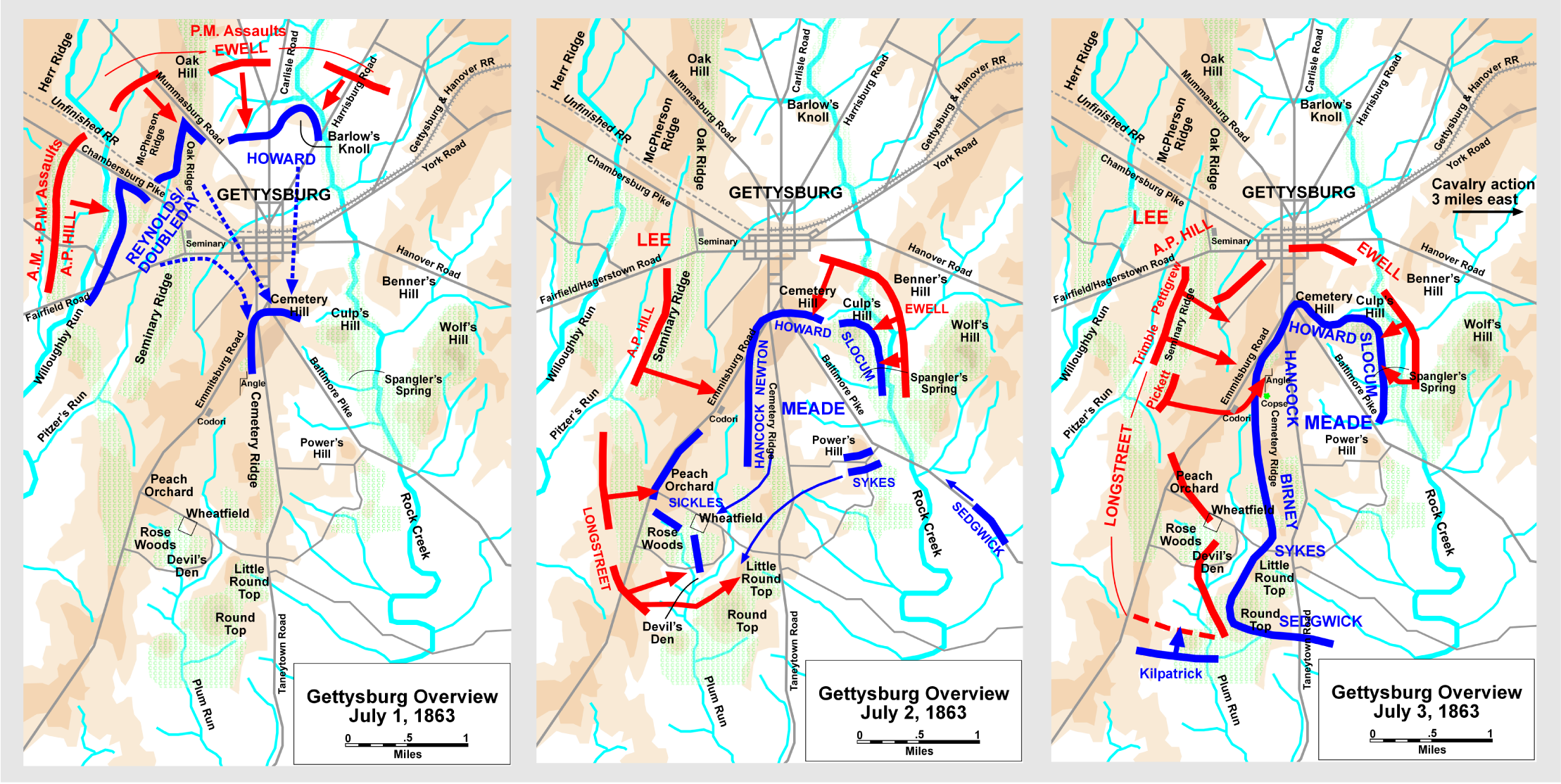
Battle formations over the course of three days. It's easy to see here, the Union's fish hook position they took atop Cemetery Hill.
July 3rd marked the final day of the Battle of Gettysburg. Much like the previous day, Lee once again ordered his men to charge the Union position, and for most of the day, like the previous day, this ended in failure. The Union Army, which was even more entrenched on this day than the previous, repelled the Confederate forces. However, around 3PM, with orders from Lee, Confederate Major General George Pickett led 12,500 men on what is now famously known as Pickett’s Charge. The purpose of this charge was obvious, break the Union line, which would in turn split it. The difficulty of this proposition could not be overstated. The Union Army was entrenched, and though the position targeted was a weaker point in the line, the charge was still uphill. Some of Pickett’s men were able to break the Union line, but with help from reinforcements, they were unable to hold their ground. The charge itself was a colossal failure, of the 12,500 men that participated in the charge, there were over 6000 casualties, and almost 4000 were captured. This sent the Confederate Army into disarray and forced them to retreat from Gettysburg entirely, completely losing the battle.
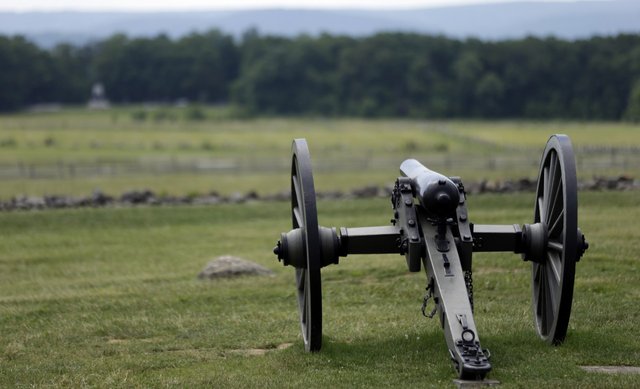
A look at the field of where Pickett's charge took place. This shot is taken from the perspective of the Union lines, though blurry, its easy to see the slope the Confederate Army had to charge up to reach the line. Though not identical, its likely the Union used a similar rock wall as cover to defend themselves from the charging Confederate Army.
The Battle of Gettysburg is remembered as the most bloody battle in American history. Its believed there were over 50,000 casualties combined during this battle, with almost a quarter of the confederates casualties taking place during Pickett’s charge. Though the war would go on for another two years, the peak of Pickett’s charge is considered by most historians to be the high water mark of the confederacy. The battle is also significant because at the onset of Gettysburg, Union General George G. Meade had only been the general of the Army of the Potomac (Which was the name for the Union Army in the East) for three days. His victory at Gettysburg finally provided the eastern front a competent leader, something they had lacked since the beginning of the war. Also, with the confederacy’s defeat at Gettysburg, any hope of being recognized by Britain as a viable nation, were destroyed. The Confederacy would never recover.
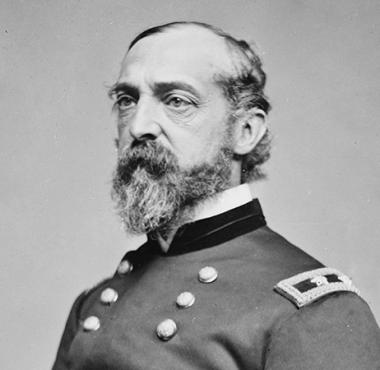
General George Meade
As a former northerner who now lives in the south I feel somewhat divided over Civil War posts.
Hey, but now you're in an area where you can gloat. So thats a plus.
Congratulations @olympus-mons! You have completed some achievement on Steemit and have been rewarded with new badge(s) :
Click on any badge to view your own Board of Honor on SteemitBoard.
For more information about SteemitBoard, click here
If you no longer want to receive notifications, reply to this comment with the word
STOP